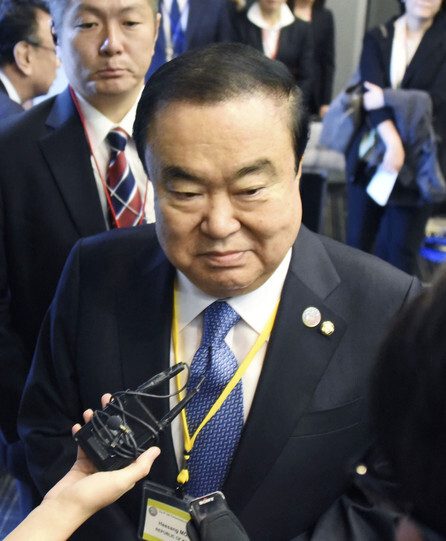hankyoreh
Links to other country sites 다른 나라 사이트 링크
[Editorial] Moon Hee-sang’s proposal could be starting point for S. Korea-Japan dialogue

During a visit to Japan on Nov. 5, National Assembly Speaker Moon Hee-sang made an augmented “one plus one” proposal for providing compensation to forced laborers and other victims by setting up a fund based on voluntary contributions from South Korean and Japanese companies and citizens. While opinions may differ about the substance of his proposal, this is an encouraging development, presuming it can kick-start dialogue for resolving the two countries’ dispute. Now is the time for the Japanese government to move away from its current position that the issue of compensation for forced laborers was fully resolved by the 1965 claims agreement and to start discussing practical solutions.
Moon made the proposal about a compensatory fund for historical victims during a lecture at Japan’s Waseda University. “Not only implicated companies in South Korea and Japan but also unrelated companies could donate to the fund. We could add donations from the general public in both countries and the 6 billion won (US$5.19 million) that remains in the Reconciliation and Healing Foundation,” the speaker said. His proposal would upgrade the South Korean government’s “one plus one” plan, under which the government would help South Korean and Japanese companies set up a fund, by expanding the range of participation in the fund and by making contributions voluntary.
This proposal has yet to win a consensus in South Korea or Japan, and it undeniably contains controversial aspects. Primary among these is that voluntary donations by Japanese companies could be accused of contravening the spirit of the South Korean Supreme Court’s ruling about compensation, in which the perpetrators were held strictly responsible. It’s also uncertain whether the victims of forced labor themselves would be willing to accept these terms. We have already seen that attempts to solve past grievances without securing the consent of the victims are doomed to fail. That’s why the Blue House and the Ministry of Foreign Affairs appear to be distancing themselves from Moon’s proposal, describing it as being a “personal idea.”
Nevertheless, we believe that the proposal is meaningful in the sense that it could finally get the ball rolling on dialogue between South Korea and Japan. Significantly, Moon expressed his intention to table a bill in the National Assembly to give his proposal legal backing, calling for a “comprehensive solution” for not only the forced laborers but also for the comfort women issue.
At this juncture, we should give serious thought to the idea of taking a comprehensive approach to the issue of compensation for historical victims, which is the key challenge in South Korea-Japan relations.
South Korea-Japan relations had been moving in a dire direction, but Prime Minister Lee Nak-yeon’s visit to Japan and the unexpected meeting between the South Korean and Japanese leaders appear to signal a shift toward dialogue. There seems to be a growing consensus in both South Korea and Japan about the need to restore bilateral relations. Since Moon has made a new proposal, we hope the Japanese government and political establishment will respond in kind. We look forward to seeing the Japanese adopt a flexible and forward-looking attitude.
Please direct comments or questions to [english@hani.co.kr]

Editorial・opinion
![[Column] Season 2 of special prosecutor probe may be coming to Korea soon [Column] Season 2 of special prosecutor probe may be coming to Korea soon](https://flexible.img.hani.co.kr/flexible/normal/500/300/imgdb/original/2024/0426/3317141030699447.jpg) [Column] Season 2 of special prosecutor probe may be coming to Korea soon
[Column] Season 2 of special prosecutor probe may be coming to Korea soon![[Column] Park Geun-hye déjà vu in Yoon Suk-yeol [Column] Park Geun-hye déjà vu in Yoon Suk-yeol](https://flexible.img.hani.co.kr/flexible/normal/500/300/imgdb/original/2024/0424/651713945113788.jpg) [Column] Park Geun-hye déjà vu in Yoon Suk-yeol
[Column] Park Geun-hye déjà vu in Yoon Suk-yeol- [Editorial] New weight of N. Korea’s nuclear threats makes dialogue all the more urgent
- [Guest essay] The real reason Korea’s new right wants to dub Rhee a founding father
- [Column] ‘Choson’: Is it time we start referring to N. Korea in its own terms?
- [Editorial] Japan’s rewriting of history with Korea has gone too far
- [Column] The president’s questionable capacity for dialogue
- [Column] Are chaebol firms just pizza pies for families to divvy up as they please?
- [Column] Has Korea, too, crossed the Rubicon on China?
- [Correspondent’s column] In Japan’s alliance with US, echoes of its past alliances with UK
Most viewed articles
- 1AI is catching up with humans at a ‘shocking’ rate
- 2After election rout, Yoon’s left with 3 choices for dealing with the opposition
- 3Is Japan about to snatch control of Line messenger from Korea’s Naver?
- 4No good, very bad game for Korea puts it out of Olympics for first time since 1988
- 51 in 5 unwed Korean women want child-free life, study shows
- 6Will NewJeans end up collateral damage in internal feud at K-pop juggernaut Hybe?
- 7Korea’s 1.3% growth in Q1 signals ‘textbook’ return to growth, says government
- 8Marriages nosedived 40% over last 10 years in Korea, a factor in low birth rate
- 9[Editorial] Japan’s rewriting of history with Korea has gone too far
- 10Why Korea shouldn’t welcome Japan’s newly beefed up defense cooperation with US